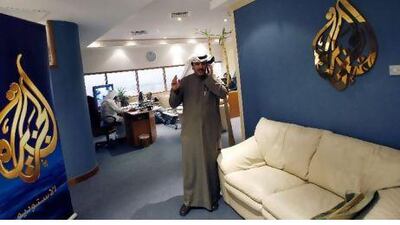KUWAIT CITY // Three members of Kuwait's parliament yesterday asked to question the prime minister in parliament over a police crackdown on a political rally last week.
Meanwhile the Kuwaiti office of Al Jazeera, the Qatar-based satellite news channel, was closed yesterday as political tension escalates in the aftermath of the incident. The channel had aired extensive footage of the skirmish, which sent four members of the parliament and several civilians to hospital with injuries.
Musallam al Barrak, one of the legislators who presented the request, said during a news conference in the National Assembly that the government had "violated the constitution and infringed civil liberties" when it broke up the rally. The gathering was held to protest a government attempt to lift the parliamentary immunity of an opposition MP.
The speaker of the house, Jassem al Kharafi, said the request will be on parliament's agenda on December 28.
The copy of the request called the police crackdown a "barbaric attack with batons" and said that police attacked "members of parliament who were trying to calm the situation down".
The move comes one day after the emir, Sheikh Sabah al Ahmed al Jaber al Sabah, told the editors-in-chief of local newspapers at the ruler's court in Seif Palace that the incident was not the fault of the police special forces, who were applying the law. He said organisers ignored the repeated orders of the security officials. Earlier in the day, the government had announced that gatherings were banned outside local meeting halls, known as diwaniyas, such as the villa where the protest took place.
The undersecretary for public security affairs, Maj Gen Khalil al Shamali, said in comments published on the state news agency Kuna last week that large numbers of the crowd were seen sitting on the grass outside the villa, while many of the seats inside the building were empty.
"We realised that the organisers were just procrastinating and deliberately breaching the laws. The dispute heated when the attendees started swearing at us and throwing empty bottles," Maj Gen al Shamali said, adding that the clash against "the attackers" took place outside the building.
Ali al Rasheed, a pro-government, liberal legislator, said during an interview in the National Assembly yesterday that the government's heavy-handed reaction to the protest was a mistake.
"They wanted the special forces to beat them, because after that they will get sympathy from the people," Mr al Rashid said. "The day before it happened, everybody was against them, now it's a little bit different."
The request to question Prime Minister Sheikh Nasser Mohammed al Sabah was tabled by representatives of populist, Islamist and liberal political groups. Despite diverse backing, Mr al Rashid believes the opposition will not have enough strength to win the support of a majority of MPs in a vote of non-co-operation which could be held after the questioning, with the support of 10 MPs. If Sheikh Nasser was to fail, the emir would have to either replace him or dissolve the assembly.
Kuwait's constitution allows any minister to question any member of the parliament but, until recently, challenging the prime minister was a red line the MPs would not cross. Sheikh Nasser was the first leader of the cabinet to be questioned by MPs, behind closed doors, last year over a cheque issued to a former MP. He retained the support of the house.
Kuwait has balked at the international media attention the melee outside the diwaniya event has drawn. The ministry of information announced on Kuna that Al Jazeera's office was closed and its licence revoked because it had covered events in a way that was "deemed an infringement upon the country's internal affairs".
The Doha-based satellite channel said on its website that the ministry had threatened to close its office in Kuwait on Friday if an interview with the opposition parliamentarian Mr al Barrak took place later that day.
The office director declined the request but offered to host a government representative on the same programme, a suggestion that the ministry refused, the article said.
The government closed Al Jazeera's office in 2002 because of reporting that was perceived to be hostile to Kuwait. It reopened in 2005.

